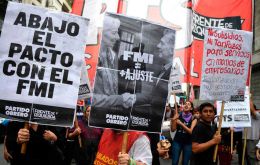MercoPress. South Atlantic News Agency
Tag: Martin Guzman
-
Saturday, December 28th 2019 - 09:55 UTC
Argentina will continue to honor its debt, and has cleared all 2019 payments

The Argentine government will continue to honor its debt while it works to reach an agreement with creditors, both the IMF and private bond holders, with the purpose of refinancing commitments and achieve a long term sustainable path for the payments, according to sources from the Economy ministry.
-
Thursday, December 19th 2019 - 09:59 UTC
Argentina emergency bill in Congress: 30% tax on dollar purchases and six month freeze on public utilities rates

Argentina's new government announced on Tuesday a 30% tax on foreign currency purchases and a six-month freeze on public utility prices as part of a raft of measures to boost growth. The government of President Alberto Fernandez, who took office last week, had already announced increases in taxes on agricultural exports over the weekend.
-
Saturday, December 7th 2019 - 09:58 UTC
Fernandez unveils his cabinet and heterodox economic team with a growth led recovery plan

Argentine President-elect Alberto Fernandez unveiled his cabinet and new central bank chief on Friday evening, laying out his core team days before the center-left leader takes office facing a stalled economy, rising debt fears and painful inflation.
-
Saturday, December 7th 2019 - 09:50 UTC
Future Argentine economy minister is US trained and an academic expert in sovereign debt

Argentina’s Martin Guzman, a whiz-kid economist with close ties to influential U.S. economist Joseph Stiglitz, will bring a sharp academic intellect but little policy-making experience to the daunting task of reviving Latin America’s third-largest economy and averting a damaging default.
-
Thursday, April 11th 2019 - 09:31 UTC
The Trouble with Argentina’s Economy

With sustained economic growth, Argentina would be able to avoid another debt crisis. Although there are no silver bullets to put the economy on a more stable path, changing current macroeconomic policies would at least give the country a chance.
-
Saturday, April 2nd 2016 - 07:04 UTC
How hedge funds held Argentina for ransom

By Martin Guzman and Joseph E. Stiglitz (*) - Perhaps the most complex trial in history between a sovereign nation, Argentina, and its bondholders — including a group of United States-based hedge funds — officially came to an end yesterday (March 31) when the Argentine Senate ratified a settlement.
